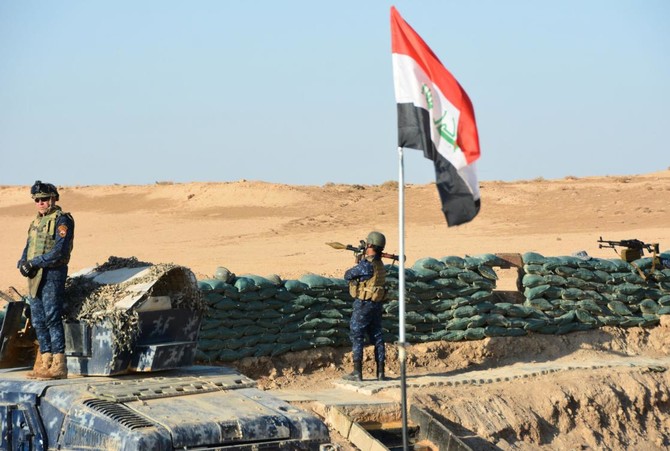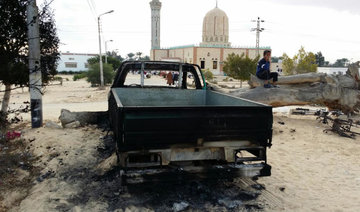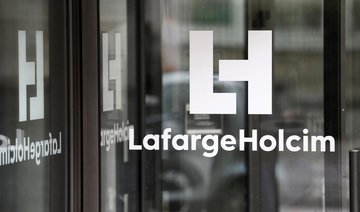BAGHDAD: Iraqi federal and Kurdish regional judiciaries are violating the rights of Daesh suspects with flawed trials, arbitrary detentions under harsh conditions, and broad prosecutions, Human Rights Watch said on Tuesday.
As the militant group’s self-proclaimed caliphate crumbles following defeats in Iraq and Syria, thousands suspected of joining it have been captured, detained, and put on trial.
At least 200 have been sentenced, Human Rights Watch said, and at least 92 executed.
Iraq’s government faces the task of exacting justice on Daesh members while preventing revenge attacks on people associated with the group which could only undermine efforts to create long-term stability.
The New York-based rights group said that an 80-page report it released early on Tuesday “finds serious legal shortcomings that undermine efforts to bring (Daesh) fighters, members, and affiliates to justice.”
A spokesman for Iraq’s Supreme Judicial Council, which supervises the federal judiciary, declined to comment on the contents of the report ahead of its release.
Issues highlighted by the HRW report:
- It is too easy to accuse someone of belonging to Daesh and have them detained. Wanted lists or community accusations without evidence can result in the detention of suspects for months even if wrongly accused.
- Detention centers are overcrowded and authorities fail to separate children from adult detainees. Iraqi law states detainees should be brought to a judge within 24 hours of capture but this does not happen.
- Detainees are often subject to torture, not granted access to lawyers, and their families are not informed of their whereabouts. Iraqi authorities say they have investigated these allegations but have not released any findings.
- The reliance of Iraqi and Kurdish courts on counter terrorism laws to prosecute suspects rather than using other laws in the criminal code means crimes are not prioritized by seriousness and victims are not included in the process as suspects are not tried for individual acts of murder, rape, torture or slavery.
- Proving guilt under counter-terrorism laws is easier as a judge only needs proof that a defendant was a member of Daesh to find them guilty. This means that anyone from cooks and doctors serving under the group to actual fighters is subject to the same sentences which range from life in prison to death.
This stretches Iraq’s resources thin as casting such a wide net means the courts would not have enough time or manpower to go through all cases, the report says, and prevents victims from getting personal justice.
HRW said that when it raised concerns over prosecutors not charging suspects with crimes under the criminal code, judicial authorities said there was no need.
“Genocide and terrorism are the same crime, why would we need a separate charge for genocide?” the report quoted one counter-terrorism judge as saying.
Iraq accused of violating due process for Daesh suspects
Iraq accused of violating due process for Daesh suspects

France congratulates new Lebanon president, calls for ‘strong government’

- French foreign ministry said Joseph Aoun's election “opens a new page" for Lebanon
PARIS: France on Thursday welcomed the election by Lebanese lawmakers of army chief Joseph Aoun as president after a two-year vacuum at the top, urging the formation of a strong government to drag the country out of a political and economic crisis.
Extending France’s “warm congratulations” to Aoun, the French foreign ministry said his election “opens a new page for the Lebanese” and urged “the appointment of a strong government” that can help the country recover.
Italian foreign minister to meet Syria's new rulers in Damascus

- Antonio Tajani said he would push Syria’s transitional government to pursue an “inclusive political process”
ROME: Italy’s Foreign Minister Antonio Tajani said Wednesday he would travel to Syria Friday where he plans to announce an initial development aid package for the country ravaged by years of war.
Tajani’s trip follows those by his French and German counterparts, who visited the Syrian capital last week to meet Syria’s new rulers after they toppled Bashar Assad's regime in a lightning offensive last month.
“It is essential to preserve territorial integrity and prevent (Syria’s) territory from being exploited by terrorist organizations and hostile actors,” Tajani told parliament.
Western powers have been cautiously hoping for greater stability in Syria, a decade after the war triggered a major refugee crisis that shook up European politics.
Tajani did not provide any details about what he called a “first package of aid for cooperation and development.”
Tajani said he would push Syria’s transitional government to pursue an “inclusive political process” that “recognizes and enhances the role of Christians as citizens with full rights.”
Ahead of his trip, Tajani is set Thursday to meet with the foreign ministers of France, Germany, Britain and the United States over the Syria situation, with the drafting of a new constitution and Syria’s economic recovery on the agenda.
The EU’s foreign affairs chief, Kaja Kallas, was expected in Rome for the meeting.
Thousands of Alawites mourn 3 killed by foreign Islamists: monitor, witness

- “Thousands of mourners gathered at the funeral of three Alawite farmers from the same family,” said the Syrian Observatory for Human Rights
- The civilians were killed on Wednesday in the village of Ain Sharqia
DAMASCUS: Thousands of Syrians from ousted President Bashar Assad’s Alawite community mourned on Thursday three civilians killed by foreign Islamist allies of the country’s new authorities, a war monitor and an attendee said.
Since Assad’s ouster, violence against Alawites, long associated with his clan, has soared, with the monitor recording at least 148 killings.
“Thousands of mourners gathered at the funeral of three Alawite farmers from the same family, including one child, killed by foreign Islamist fighters allied to Syria’s new authorities,” said the Syrian Observatory for Human Rights war monitor.
The civilians were killed on Wednesday in the village of Ain Sharqia, in the Alawite heartland of Latakia province, the Observatory said.
“Down with the factions,” some of those in attendance chanted in reference to armed groups, according to footage shared by the monitor.
Mourner Ali told AFP that people had called for those responsible for the killings to be punished and for foreign fighters to leave so that local policemen affiliated with the new authorities could take their place.
“We can’t have people die every day,” he said, asking to be identified only by his first name to discuss sensitive matters.
“We want security and safety to prevail; we support the transitional authorities. We do not want any more killings after today.”
Rami Abdel Rahman, who heads the Observatory, told AFP the mourners also demanded that Syria’s new rulers free thousands of detained soldiers and conscripts.
The Alawite community was over-represented in the country’s now-defunct armed forces.
On Tuesday, three Alawite clerics were also killed by unknown gunmen on the road from Tartus to Damascus, the monitor said.
Another cleric and his wife were found dead in the Hama countryside Thursday after they were abducted a day earlier.
Last month, angry protests broke out in Syria over a video showing an attack on an Alawite shrine, with the Observatory reporting one demonstrator killed in Homs city.
Syrian authorities said the footage was “old” and that “unknown groups” were behind the attack, saying republishing the video served to “stir up strife.”
The alliance spearheaded by the Islamist group Hayat Tahrir Al-Sham (HTS), which seized Damascus and ousted Assad on December 8 after a lightning offensive, has sought to reassure minority communities in the Sunni Muslim majority country.
Assad had long presented himself as a protector of minority groups.
Lebanon’s new president promises to rebuild what ‘Israel has destroyed’

- The Mediterranean country has been without a president since the term of Michel Aoun ended in October 2022
BEIRUT: Newly elected Lebanese president Joseph Aoun has promised to rebuild what the Israeli occupation has destroyed, in a speech before parliament after taking his oath of office.
The Lebanese state will be able to remove Israeli occupation and the effects of its aggression, Aoun said, after hurdling the second round of voting in parliament to become the country’s new president.
“I promise to reconstruct what Israel destroyed in the south and Beirut’s southern suburbs,’ he said.
The newly elected president also touched on the Palestinian issue, saying he rejects the settlement of Palestinian people and guaranteed their right to return.
He also pledged to work towards the best of relations with Arab countries, and cooperate with Syria to control the borders from both sides.
The Mediterranean country has been without a president since the term of Michel Aoun – not related – ended in October 2022, with tensions between the Iran-backed Hezbollah movement and its opponents scuppering a dozen previous votes.
During parliament’s first session on Thursday morning, 71 out of 128 lawmakers voted in favor of the army commander, short of the required 86, in the first round of the vote.
Thirty-seven members of parliament voted blank, including 30 lawmakers from the pro-Hezbollah bloc, according to a source close to it.
Twenty ballots were declared null and void.
Aoun received 99 votes during the second round, more than the minimum votes required for him to be voted into office.
But international pressure has mounted for a successful outcome with just 17 days remaining in a ceasefire to deploy Lebanese troops alongside UN peacekeepers in south Lebanon after a Hezbollah-Israel war last autumn.
Speaker Nabih Berri then suspended the session until 2:00 p.m. sparking outrage from some lawmakers who demanded an immediate second vote.
The president’s powers have been reduced since the end of the 1975-1990 civil war. But filling the position is key to overseeing consultations toward naming a new prime minister to lead a government capable of carrying out reforms demanded by international creditors.
Lebanon’s divided political elite usually agrees on a consensus candidate before any successful parliamentary vote is held.
Aoun, who will turn 61 on Friday, appears to have the backing of the United States and key regional player Saudi Arabia.
US, Saudi and French envoys have visited Beirut to increase pressure in the run-up to the vote.
Pope Francis on Thursday expressed hope that Lebanon could “possess the necessary institutional stability... to address the grave economic and social situation.”
Several lawmakers have objected to what they see as foreign interference in the vote.
In protest, some rendered their ballot void by voting for “sovereignty and the constitution,” a reference to the fact that Aoun’s election would also require a constitutional amendment.
Under Lebanon’s constitution, any presidential candidate must have not held high office for at least two years. Aoun is still head of the army, after extending his mandate past his planned retirement.
Critics have accused Hezbollah and allies of scuppering previous votes.
But a full-fledged war between Israel and Hezbollah last autumn dealt heavy blows to the Shiite militant group, including the death of its longtime leader Hassan Nasrallah in an air strike.
In neighboring Syria, Hezbollah has lost a major ally after militants toppled President Bashar Assad last month.
Under multi-confessional Lebanon’s power-sharing system, the president must be a Maronite Christian. Aoun is Lebanon’s fifth army commander to become president, and the fourth in a row.
Military chiefs too are, by convention, Maronites.
The new president faces daunting challenges, with the truce to oversee on the Israeli border and bomb-damaged neighborhoods in the south, the east and the capital to rebuild.
Since 2019, Lebanon has been gripped by the worst financial crisis in its history.
The Hezbollah-Israel war has cost Lebanon more than $5 billion in economic losses, with structural damage amounting to billions more, according to the World Bank.
UN migration agency appeals for $73 million in aid for Syria

- UN’s International Organization for Migration more than doubling an appeal launched last month for Syria
- The Geneva-based agency said it was working to reestablish its presence inside Syria
GENEVA: The UN migration agency on Thursday expanded an aid appeal for Syria to over $73 million, as the country transitions after years of civil war and decades of dictatorship.
The United Nations’ International Organization for Migration said it was more than doubling an appeal launched last month for Syria, from $30 million to $73.2 million, with the aim of assisting 1.1 million people across Syria over the next six months.
“IOM is committed to helping the people of Syria at this historical moment as the nation recovers from nearly 14 years of conflict,” IOM chief Amy Pope said in a statement.
“IOM will bring our deep experience in humanitarian assistance and recovery to help vulnerable communities across the country as we work with all partners to help build a better future for Syria.”
The Geneva-based agency said it was working to reestablish its presence inside Syria, after exiting Damascus in 2020, building on its experience working there in the preceding two decades, as well as on its cross-border activities in the past decade to bring aid to northwest Syria.
It said it aimed “to provide immediate assistance to the most at-risk and vulnerable communities, including displaced and returning groups, across Syria.”
The requested funds, it added, would be used to provide essential relief items and cash, shelter, protection assistance, water, sanitation, hygiene and health services.
They would also go to providing recovery support to people on the move, including those displaced, or preparing to relocate.
The dramatic political upheaval in Syria after the sudden ousting last month of strongman Bashar Assad after decades of dictatorship has spurred large movements of people.
Half of Syria’s population were forced from their homes during nearly 14 years of civil war, with millions fleeing the country and millions more displaced internally.
The UN refugee agency has said it expects around one million people to return to the country in the first half of this year.
And by the end of 2024, the UN humanitarian agency had already recorded the returns of nearly 500,000 people who had been internally displaced inside Syria, IOM pointed out.





















